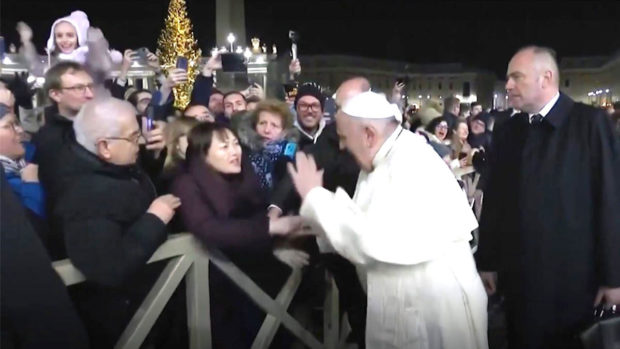A glimpse into Pope Francis’ inner struggles

Pope Francis slapping the hand of a devotee who refused to let go of his. SCREENGRAB
“A mistake that makes you humble is better than an achievement that makes you arrogant.”
Isn’t a saint remembered for the outstanding virtues he practiced? And isn’t the principal purpose of his fiesta is for our edification? Not Saint Jerome (347-420 AD), who gave us the Vulgate Bible, for he is frequently remembered for his bad temper! I remember Mother Angelica (1923-2016), the Poor Clare founder of Eternal Word Television Network (EWTN), who shared her own struggles with bad attitude, saying: “Saint Jerome used to hit himself with a rock every time he lost his temper. I’d be dead as a doornail with no ribs if I did that.”
Another saint with inner nastiness in his youth was Francis de Sales (1567-1622), who acknowledged that his blood boiled every time he heard certain unpleasant or impure jokes and said he struggled for almost two decades to overcome his temper (Introduction to the Devout Life, 1609). Spiritual progress is neither predictable nor automatic for them, so it seems saints did struggle a lot all their lives.
Before priesthood, handsome Jorge Mario Bergoglio was powerfully attracted to and fell head over heels for an Argentine lady. Were there internal struggles when he finally sacrificed marital life in choosing the priestly vocation? Definitely! And the interior struggles did not stop there, for, after ordination, the priest now empowered with angelic dignity remains an earthly being infected by the poison of original sin. So is the pope.

The young, pre-Pope Jorge Mario Bergoglio.
The Vicar of Christ on earth remains earthly, mortal, and delicate like everyone else until buried six feet below the ground. He weeps when falsely accused and cries when badly hurt. He also bleeds when pricked and laughs when tickled. And, not surprisingly, he supported the San Lorenzo de Almagro football team, watched the movies of Tita Merello, and danced the tango.
Brittle like potato chips, priests and religious are tempted too and crack, can succumb to seduction, or can be corrupted. Human. Vulnerable. Miserable. They too can act out of pride, jealousy, or selfishness. After ordination the frail, created being has become an alter Christus, “another Christ”; oh yes, God’s ambassador plenipotentiary. Alas, the Sacrament of Holy Orders, or being the spiritual leader of 1.5 billion Catholics, cannot disconnect the human tendencies from the ordained minister. Put it simply, the wretched condition is empowered to do both mammoth administrative and supernatural functions, and His Holiness, like any ordinary person, personally struggles in a sort of spiritual combat within himself.
It was a beautiful evening. While Pope Francis, an octogenarian afflicted with sciatica, was greeting devotees behind a set of barriers, an overly enthusiastic woman grabbed his hand and wouldn’t let go. The Holy Father got visibly annoyed, slapped her hand a couple of times, trying to free himself. After watching the video of that New Year’s Eve incident, I thought that if anybody needed to apologize it was the overly enthusiastic lady rather than the Holy Father. Under similar circumstances, the Pope’s “nasty” reaction was natural, for he responded in a way most older folks would do. I guess, Pope Francis is Pope Francis, and his apology on New Year’s Day was both sincerely personal and urgently pastoral.
It was sincerely personal. “At 83, I am still struggling with my temper,” the Holy Father seemed to say when he apologized during his Angelus address. Of course, his struggles are quite remote in physical force and emotional intensity from his predecessor’s, St. Peter the First Pope, who let his temper flair, drew a sword, “and struck the high priest’s servant, cutting off his ear” (Matthew 26:51). “Love makes us patient,” said the Pope during his Angelus address. “We often lose patience. So do I. And I apologize for yesterday’s bad example…” vaticannews.va/en/pope/news/2020-01).
It was also urgently pastoral. Leadership is witnessing as it assumes an irreplaceable role of giving good example – at all times. For Pope Francis, slapping the hand of the lady was a mistake, a manifestation of a lack of patience, and therefore a bad example. A bad example is the exact opposite of good leadership and must be corrected pronto. When he apologized for his “bad example,” he was actually correcting his bad example with a good example, and a good example, the Holy Father knew, has ten times the force and impact of a good word.
I end with the aphorism attributed to Benjamin Franklin, “A good example indeed is the best sermon.”
Jose Mario Bautista Maximiano (facebook.com/josemario.maximiano) is the author of MDXXI (1521): Ecclesia semper purificanda (Claretian, 2020) and 24 PLUS CONTEMPORARY PEOPLE: God Writing Straight with Twists and Turns (Claretian, 2019).

